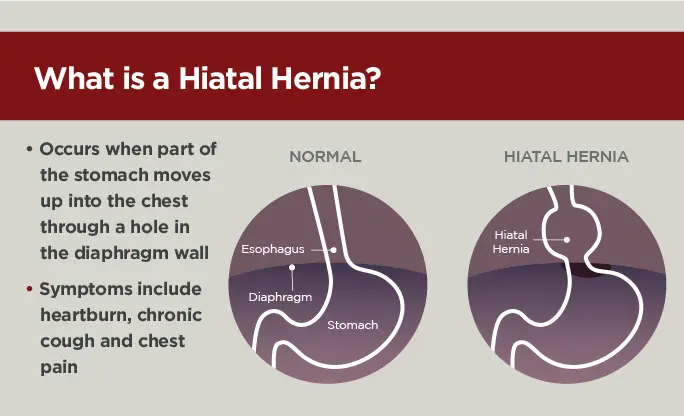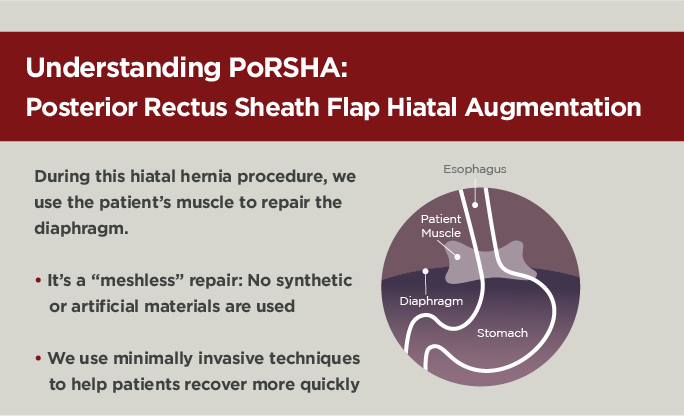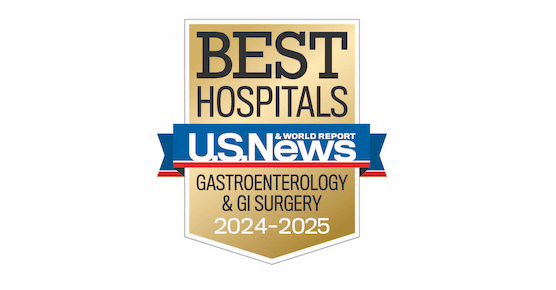Hiatal Hernia (Paraesophageal Hernia)

Hiatal hernias, also known as paraesophageal hernias, occur when part of the stomach pushes into the chest through an opening in the muscle wall (known as the diaphragm) that separates the organs in the chest and abdomen.
At the University of Chicago Medicine, our surgeons are experts in repairing these types of hernias. In fact, our UChicago surgeons have developed a new type of surgery for large paraesophageal hernias that doesn’t require the placement of a permanent mesh implant.
What is a hiatal hernia or paraesophageal hernia?
A paraesophageal or hiatal hernia occurs when part of the stomach moves up into the chest through a hole in the muscular wall called the diaphragm.
The most common type is called a sliding hiatal hernia, in which the stomach and part of the esophagus “slide” up into the chest. A less common but more serious type is a paraesophageal hernia, which occurs when a large part of the stomach bulges up through the diaphragm into the chest so it is pushing into your lungs and heart.
Frequently Asked Questions
People with a paraesophageal or hiatal hernia can experience a range of uncomfortable symptoms that are similar to gastroesophageal reflux disease (GERD). These symptoms may include:
- Heartburn
- Chronic cough
- Feeling stomach acid flow up into your esophagus
- Getting full quickly or having pain after eating
- Shortness of breath
- Chest pain
- Trouble swallowing
- Anemia (low red blood cells) without a known cause
In many cases, people may have some of these symptoms for years before they are diagnosed with a hiatal hernia or paraesophageal hernia, which can be treated.
People may notice more frequent or severe heartburn, chest pain, coughing or other symptoms as their hernia gets worse.
Symptoms like sharp chest pain, vomiting, fever and bloody stools could be signs that the stomach has “twisted” and cut off its blood supply, which can happen if some hernias are not treated. This is considered a medical emergency that requires surgery.
In many people with paraesophageal or hiatal hernias, the diaphragm becomes weaker as they get older. Eventually, a “hole” develops in the muscle wall that becomes bigger over time, creating an opening for the stomach to move up into the chest.
Older people are most at risk for hiatal and paraesophageal hernias because the diaphragm becomes weaker with age. Other factors that may contribute to these hernias are obesity, previous pregnancy, and physical strain or trauma.
Typically, people who develop the more serious paraesophageal hernias are older women, although men may also have them. Researchers haven’t identified the reason why women are more affected than men by paraesophageal hernias.
If you have symptoms such as heartburn or feeling full soon after eating, your doctor may recommend various tests to determine if you have a hernia. These may include:
- Chest X-ray, which involves swallowing a liquid called barium so doctors can check your esophagus and stomach
- Upper endoscopy, in which a tube with a tiny camera is inserted down your throat to check your esophagus and stomach
- Esophageal manometry, which measures how well the muscles in your esophagus work
Paraesophageal and hiatal hernias tend to get worse over time, making them more difficult to treat. That is why we recommend early diagnosis and treatment whenever possible.
Many times, people with these hernias don’t even realize how much their symptoms are affecting their daily lives until they have surgery to ease their discomfort.
If you have a paraesophageal or hiatal hernia, surgery may help you regain control of your life again. It may also help you avoid having emergency surgery down the road if your stomach “twists” and cuts off your blood supply to your stomach, which can happen in people with paraesophageal hernias. That is why doctors typically recommend surgery to treat a hernia before it becomes an emergency.
At UChicago Medicine, surgeons use minimally invasive procedures and robotic surgery to repair hiatal and paraesophageal hernias. After surgery, most people can go home the same day or the following day. Most patients find relief from their symptoms within a few weeks.
Your surgeon will work with you to determine if you are a good candidate for surgery. In general, you may be a candidate if:
- A large portion of your stomach has moved into your chest
- You have frequent symptoms like heartburn and chronic cough
- You are healthy enough for surgery
Our expert surgical team performs a high volume of surgeries to treat hiatal hernias as well as serious paraesophageal hernias. Our team was also the first in the world to advance a new technique to treat paraesophageal hernias called a posterior rectus sheath flap hiatal augmentation (PoRSHA). PoRSHA eliminates the need for the use of mesh.

A new surgery for patients with paraesophageal and hiatal hernias
Traditional paraesophageal repairs typically use artificial or biological mesh to close the hole in the diaphragm. During a posterior rectus sheath flap hiatal augmentation (PoRSHA), the surgeon uses the patient’s own muscle to repair the diaphragm, so a mesh implant is not necessary. Specifically, the surgeon takes part of the muscle attached to the liver and creates a “flap” that helps support the diaphragm. The surgery is completely "meshless" — no synthetic or artificial materials are used. We perform it using robotic and minimally invasive surgery techniques for a quicker recovery.
You may be a candidate for this novel approach if you have a large paraesophageal hernia or a recurrent hiatal hernia.

Nationally Ranked in Gastroenterology and GI Surgery
According to U.S. News & World Report's 2024-25 Rankings.
Learn more about U.S. News Best HospitalsRequest an Appointment
We are currently experiencing a high volume of inquiries, leading to delayed response times. For faster assistance, please call 1-888-824-0200 to schedule your appointment.
If you have symptoms of an urgent nature, please call your doctor or go to the emergency room immediately.
* Indicates required field
